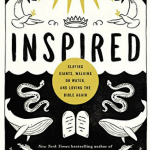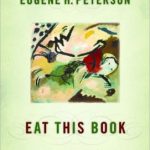
by Elizabeth Felicetti
Rachel Held Evans’ Inspired in Conversation with Eugene Peterson’s Eat This Book
I first heard Eugene Peterson’s best-selling contemporary translation of the Bible, The Message, in Old Testament class in 2004, when Dr. Cook read to us the opening of Genesis: “First this: God created the Heavens and Earth—all you see, all you don’t see. Earth was a soup of nothingness, a bottomless emptiness, an inky blackness. God’s Spirit brooded like a bird above the watery abyss.” Soon afterward, I bought my first copy and read in the introduction, “If there is anything distinctive about The Message, perhaps it is because the text is shaped by the hand of a working pastor.” Now a working pastor myself, I own three copies of The Message: one at home for personal prayer and two in my church office for sermon and Bible study preparation.
Many professional and ordained Episcopal colleagues judge me for my love of The Message. After all, it’s not one of the translations that we Episcopalians are authorized to use in church. A resolution that would have allowed this failed at General Convention in 2012. Many who disdain The Message claim to be bothered by its interpretation, labeling it a “paraphrase”; but biblical language scholars like Peterson can attest to the interpretation required by any translation. After Peterson’s death in October, I read Eat This Book: A Conversation in the Art of Spiritual Reading to learn more about his translation process, and opted to read it in conversation with a new book about the Bible, Inspired: Slaying Giants, Walking on Water, and Loving the Bible Again by Rachel Held Evans.
Peterson drew his title from the tenth chapter of the book of Revelation, where the author asks an angel for a scroll of Scripture, and the angel instructs him to eat it, saying that it will be sweet like honey but later turn bitter in his stomach, which the author finds to be true. Peterson pointed out that the prophets Jeremiah and Ezekiel also ate books. Eat This Book opens with Peterson’s description of his dog’s delighted growls over bones, leading Peterson to muse that a Hebrew word with one meaning of “growl” is typically translated as “meditate.” Those who have studied biblical Hebrew know that Hebrew’s few word choices sometimes lead to translation frustrations. (When studying biblical Hebrew in seminary, I once almost wept with frustration over a sentence I could not understand about God’s nose before finally remembering that “nose” and “anger” were the same word.) For Peterson, the musing over growling, with its connotation of deep enjoyment, led to a book-length meditation not only on reading the Bible but also on translation.
Peterson’s translation process was born out of a Bible study, when he tried to get his Presbyterian congregation to see themselves in the book of Galatians. When they had trouble, he began translating the letter himself, bringing his attempts to the study and receiving feedback from the participants. This process led to a translation of Galatians and a book about the experience, which led to an editor seeking more; until Peterson finally left the church he had loved and served for twenty-nine years to spend the next ten years translating The Message.
Peterson advocated “eating” the Bible by refusing to read it as a way to meet our own wants, feelings, and needs, as well as by refusing to read in a hurry. He wrote, “Farmers characteristically work hard, but there is too much work to do in a hurry… Farms help us learn patience and attentiveness” (Peterson 39). Reading the Bible with patience and attentiveness, chewing and growling and focusing on the text rather than ourselves, can invigorate our relationship with the Bible.
Rachel Held Evans also writes about how to read the Bible. Those who have never read anything by Evans could start with Inspired: Slaying Giants, Walking on Water, and Loving the Bible Again. Evans, now Episcopalian, was raised in an evangelical church, and had to navigate the chasm between the ways her former church and current church read the Bible. Initially Evans, who approaches her topic “as a storyteller, not a scholar” (Evans, xxii), saw the Bible as a book of rules, and now conveys delight over reading the Bible as inspired by God, rather than authored by God. She writes, “Inspiration is better than magic, for as any good artist will tell you, true inspiration comes not to the lucky or the charmed but to the faithful” (Evans xxiii).
As a storyteller herself, Evans is drawn to the Jewish tradition of midrash, which she wonderfully describes as “something of a cross between biblical commentary and fan fiction” (Evans 23), pointing out that “While Christians tend to turn to Scripture to end a conversation, Jews turn to Scripture to start a conversation” (Evans 24). Inspired may help Christians change that trend, so that more of us use scripture to begin conversations.
Evans’s strongest section takes place in the chapter “War Stories,” where she tackles troubling violence in the Old Testament and the provocative questions such narratives raise. Rather than attempting to justify the so-called war stories or dismiss these sections as uninspired, Evans offers three things she believes to be true: “not every character in these violent stories stuck with the script” (Evans 74), “we are not as different from the ancient Israelites as we would like to believe” (Evans 76), and “God would rather die by violence than commit it” (Evans 76-77).
In addition to writing about the Bible, Evans gets creative, interpreting some of it artistically. For example, she presents a short screenplay based on Job’s encounter with three friends, and retells the story of the woman at the well from a first person point of view.
When Eugene Peterson died I felt real grief, despite my normal skepticism when others lament the deaths of celebrities on social media. I valued his perspective as a writer, “working pastor,” and biblical language scholar. I also value Rachel Evans’s perspective as a writer and Episcopal layperson, and am grateful she continues the tradition of making the Bible accessible to everyday Christians. This working pastor will donate a copy of each book to our church library, and looks forward to handing them to parishioners who confess difficulty engaging with the Bible.
 Evans, Rachel Held. Inspired: Slaying Giants, Walking on Water, and Loving the Bible Again. Nashville: Thomas Nelson, 2018.
Evans, Rachel Held. Inspired: Slaying Giants, Walking on Water, and Loving the Bible Again. Nashville: Thomas Nelson, 2018.
 Peterson, Eugene. Eat This Book: A Conversation in the Art of Spiritual Reading. Grand Rapids: Eerdmans, 2006.
Peterson, Eugene. Eat This Book: A Conversation in the Art of Spiritual Reading. Grand Rapids: Eerdmans, 2006.
The Rev. Elizabeth Felicetti is the rector of St. David’s Episcopal Church in Richmond, Virginia. Her writing has appeared in literary and theological publications and has been nominated for a Pushcart Prize. She has essays forthcoming in the Connections lectionary commentary series. She tweets @bizfel.

